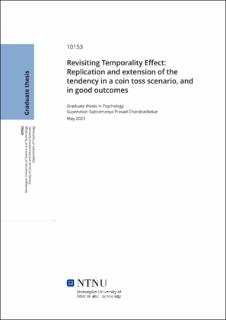| dc.contributor.advisor | Chandrashekar, Subramanya Prasad | |
| dc.contributor.author | Nordbø, Vilija | |
| dc.date.accessioned | 2023-07-11T17:20:29Z | |
| dc.date.available | 2023-07-11T17:20:29Z | |
| dc.date.issued | 2023 | |
| dc.identifier | no.ntnu:inspera:146342237:68113572 | |
| dc.identifier.uri | https://hdl.handle.net/11250/3077786 | |
| dc.description.abstract | Temporaleffekten er tendensen til å forandre den siste hendelsen, i en uavhengig rekke av handlinger (Byrne et al., 2000) Vi førsøket å undersøke temporaleffekten, med to preregistrerte replikasjoner, og en undersøkende utvidelse. Vi gjennomførte en replikasjon av myntkast scenarioet i Miller og Gunasegaram (1990), og suksessfullt replikerte de originale funnene av en temporaleffekt. Dette var gjennomgående i mutering, i tillegg til tildeling av skyld og skyldfølelse. Vi gjennomførte også en replikering av temporaleffekten i gode utfall (Byrne et al., 2000), og suksessfullt replikerte funnene på mutering, men ikke på lettelse. Våre funn viste ikke en forskjell mellom de to gruppene relatert til lettelse. Vår utvidelse fant en eliminering, og en reversering, av den vanlige temporaleffekten, som tyder på at valg kan ha en effekt på slike rekkefølge handlinger. Generelt, støtter funnene den kontrafaktuelle modellen, i en større grad, enn kreditering av grunn modellen. | |
| dc.description.abstract | The temporality effect is the tendency to mutate the latest event, in an independent sequence of events (Byrne et al., 2000). We aimed to revisit the temporality effect, with two pre-registered replications, and an exploratory extension. We conducted a replication of the coin toss scenario in Miller and Gunasegaram (1990), and successfully replicated the original findings of a temporality effect. This was consistent on mutation, in addition to attribution of guilt and blame. We also conducted a replication of the temporality effect in good outcomes (Byrne et al., 2000), and successfully replicated the findings on mutation, but not on relief. Our findings did not show a difference in the two groups in relation to relief. Our extension found an elimination, and a reversal, of the standard temporality effect, implying that choice might have an effect on such sequence events. Generally, the findings arguably support the counterfactual model, to a larger extent, than the crediting causality model.
| |
| dc.language | eng | |
| dc.publisher | NTNU | |
| dc.title | Revisiting Temporality Effect: Replication and extension of the tendency in a coin toss scenario, and in good outcomes | |
| dc.type | Bachelor thesis | |
